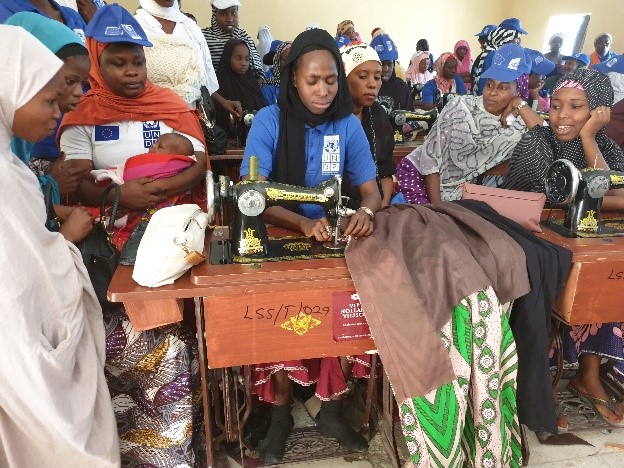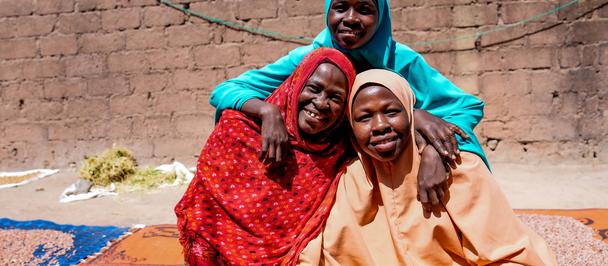--- Image caption ---
As part of its continuing support towards helping victims of insurgency in communities in North-East Nigeria, UNDP has continued to provide vocational training opportunities to community members, mostly women and youth, all aimed at facilitating long-term self-reliance through sustainable sources of livelihood. This intervention will enable conflict affected families and individuals rebuild their lives.
The intervention is part of UNDP’s early recovery response package for the victims of crisis in the North-East of Nigeria now in its 10th year. Even as relative peace returns to communities, the same lack basic infrastructure and families are yet to any level of self-reliance after being exposed to prolonged development deficits and a crisis that removed their meagre sources of livelihood.
The training programme are aimed at imparting skills in agriculture, tailoring, livestock production, nursery, machining and maintenance of cars, plumbing and pipe fitting, carpentry, home economics, welding and fabrication, computer craft, electrical installation and maintenance, furniture making, bricks/block molding, among others.
As part of the programme, trainees who complete their courses and meet the necessary requirements on various vocational skills are provided with cash grants, with which they use to set up their own businesses – similar interventions in the past have witnessed significant changes in the lives of the beneficiaries who are now able to employ other youths in their communities and also now better able to fend for their families.
This year, UNDP has trained over 1200 youths and women - enhancing the resilience capacity of vulnerable young men and women and improving the socioeconomic status of their families and communities. It has also revived interest in entrepreneurship and deepened the self-sustenance capacity of targeted beneficiaries.
Modu Kolo, a 26 years old student is a beneficiary of the programme; - his family was displaced in 2012 from Goniri in Gujba Local Government Area of Yobe State. He lost all his means of livelihood after Boko Haram attacked his community.
“I received training in tailoring; focusing on female garment making during the vocational training and now I have established my tailoring business with many customers. I utilized the grant I received to buy equipment and other materials I needed to start my business. My life has never been the same again,” Modu narrated. Modu is now able to earn an income, save up even as he has to support his siblings when they need his support.
Maryam Usman, a 19-year-old student from Ngirbuwa community in Gujba Local Government Arear of Yobe is another beneficiary of this intervention. She was financially dependent on her parents and other well-wishers. She has always had a dream of owning a computer business. After going through the programme, Maryam now owns her own business and is self-reliant.
The programme beneficiaries have also been supported with training in entrepreneurship. This has helped them understand the different and key elements needed for them to become successful entrepreneurs. Some of them are now able to conduct independent market researches, develop business proposals, improve their packaging and advertise their products.
This intervention has been made possible through funding support from the European Union, the Government of Canada, the Government of Japan, and Nigerian Humanitarian Fund. Beyond, building vocational skills, this support from partners is also facilitating the rehabilitation and reconstruction of key infrastructure and fostering reconciliation within communities in North-East Nigeria.

 Locations
Locations




